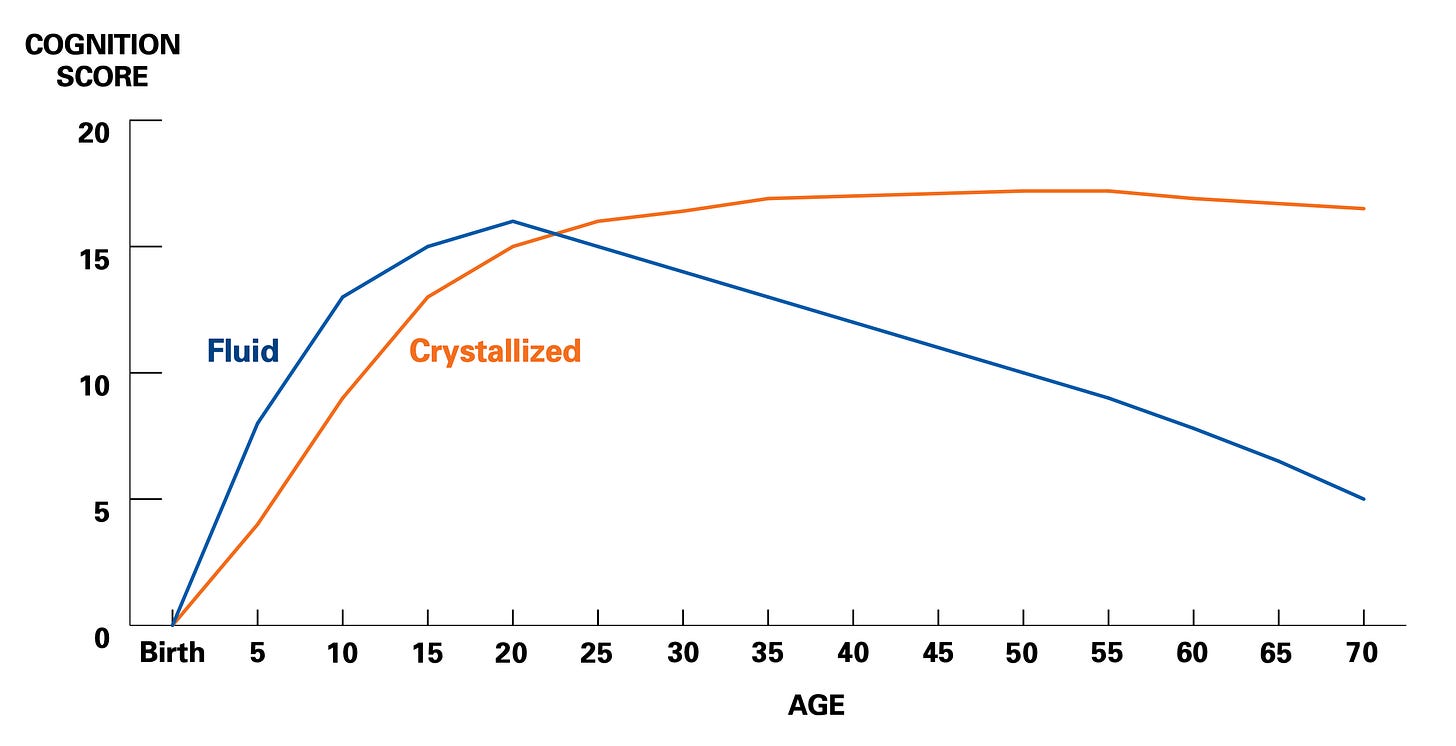Second acts
How self-awareness can propel us to fulfillment as we age

👋Hello Friends,
I've got 3 things to share with you today:
The latest episode of the Intentional Wisdom podcast
Some thoughts on second acts in life
A few pieces of fantastic content that I've consumed over the last 2 weeks
Let's go!
Ep.10 - Jesse Pujji - The Power of Conscious Leadership in Business and in Life
Jesse Pujji is an incredibly successful entrepreneur. He made millions founding and selling a digital marketing business called Ampush. Now, he runs his own venture studio where we incubates and launches new businesses. He's created three in the last 18 months alone. He's also managed to grow his Twitter following to >140k over that same period after committing to sharing insights regularly on topics like leadership and entrepreneurship.
What I wanted to talk to Jesse about was how on earth he has the time and energy to do all of this. It ended up being one of my favorite podcast conversations to-date and one that I hope you'll really find valuable.
Specifically, we covered:
How to understand what's motivating you - Jesse figured out that fear was motivating him. I give him props for admitting that. I think fear probably is a very real motivator for many of us in the decisions we make, specifically in our careers. Funny enough, fear is not actually a bad short-term motivator; the problem is that it's not sustainable, especially if long-term fulfillment is something we aspire to. There are much healthier ways to motivate oneself and we talked about how Jesse has tried to make this transition.
Coaching - Jesse credits much of his success to working with a professional coach. He says it's completely transformed his business and personal lives. His coach subscribes to the Conscious Leadership framework and much of our conversation centered around the key components of this philosophy, which I have since become extremely interested in. See content section below. I asked him how he went about finding a coach and what he'd recommend to others considering a similar path.
Operating in your 'Zone of Genius' - We talked a lot about what this concept actually means and how to leverage it. Jesse defines Zone of Genius as something that you're not only naturally good at and enjoy, but something that actually GIVES you energy. His goal is to set up his life such that he is spending 75-80% of his time in Zone of Genius activities. We discuss how to actually do this.
If you can find the time, I think this is an episode you'll really get a lot out of. I am still digesting it myself and looking to put a number of Jesse's methods into place in my own life. If you want a short preview, here's a Twitter thread I did on this episode this week, which includes several video clips on the topics above.
Second Acts
I've been thinking a lot lately about how careers develop over time. And how the things that truly fulfill us tend to change over time, too.
I've recently been listening to the audiobook From Strength to Strength by Arthur C. Brooks.
One of the core ideas covered in the book is the concept of Fluid Intelligence and Crystallized Intelligence.
Here's the basic idea: When we're young, our intelligence is fluid. We think faster. We come up with crazy new ideas. We innovate quickly - sometimes through the brute force of working crazy hours and completely immersing ourselves in areas of interest.
As we age, our brains (and bodies) change. We slow down in some ways. We lose some of our ability to innovate. We're no longer seeing the world through "beginners' eyes" so it can be more difficult to generate completely new ideas.
This is part of the reason that professionals in fields ranging from music to physics tend to do their most groundbreaking work in their 20s or early-30s before beginning a long, slow decline.
Sounds depressing, right? Well, yes, it is, if you only focus on Fluid Intelligence. The good news is that there is another "intelligence curve" that comes behind it, and that is Crystallized Intelligence.
Crystallized Intelligence is what you'd think it is. It's a form of intelligence that comes from experience. It's not dissimilar to wisdom. As we get older, our experiences accumulate. We've "seen this movie before" and we know how it's likely to play out. We also get much better at contextualizing the world around us and putting the situations we face daily into the proper perspective. And finally, while we may get worse at coming up with "the next big thing," our broad experience helps us to see connections that were invisible to us in younger age.
So what should you do with this insight? Brooks argues that the least happy and least fulfilled people are the ones who "miss their second curve." He writes about Charles Darwin, who achieved massive success at a very young age with his groundbreaking work on natural selection, but who lived out his older years in misery, always pining to get back to those younger glory days but never quite being able to get there.
He contrasts Darwin with Johann Sebastian Bach, one of the most celebrated composers of all time. Interestingly, Bach also achieved massive groundbreaking success in his field at a young age, but in his older years, his music style was seen as passe and he was supplanted in fame and popularity by his own son, Carl Philipp Emanuel Bach.
Rather than spending his older years mired in jealousy and pining for days gone by, Bach did something interesting. He completely transformed himself. He realized that his days of "commercial success" were behind him, so he poured all of his time and energy into becoming a teacher. The result? He had an extraordinarily successful second career as a renowned music instructor. And perhaps more importantly, by all accounts, he LOVED it. Contrary to Darwin, Bach appears to have relished this second career and died a truly happy and fulfilled man.
What does this all mean? There's an opportunity for us to step outside of ourselves to assess where we are in the context of our intelligence curves. Are we still trying to ride the wave of Fluid Intelligence (and thus letting it drive us into the ground)? Or are we brave enough to consider what that second curve might look like for us?
By the way, even in so-called knowledge professions, that fluid intelligence curve likely peaks well before you hit 40... not trying to depress you, just pointing out reality. By the time you get to 40, you're likely on the downslope, and in certain activities, you'll likely struggle to be as good as you once were.
But I'm an optimist. And I see Brooks' point. We can't miss that second wave. In fact, the Crystallized Intelligence wave can end up being the most fulfilling part of our careers. Often, as in Bach’s case, it can have a teaching element to it. Or it can involve roles where we can truly add value because of the greater context that we have - the connections we can make that our younger colleagues might not be able to see.
So think about what this means for you. For some, it could mean that drastic career changes make sense. For others, it may be as simple as acknowledging that this is happening and trying to shift our responsibilities, roles and day-to-day activities to better align with where we are on these curves.
There is life (and success, and fulfillment) after 40 (and after 50, 60 and 70, too).
We just need to be brave enough to embrace it.
That's it for this week, my friends.
But before you go...
Content Diet
Rich Roll Podcast - I'm already a huge fan of Rich Roll but the episodes below made me an even bigger fan. Both dive into the concept of ageing and what it means to be an "elder" in today's day and age in the context of our careers, and more broadly in life. If this idea of Fluid Intelligence and Crystallized Intelligence is interesting to you, I'd listen to the Arthur C. Brooks conversation as a starter and if you're as intrigued as I was, you can move onto his book, From Strength to Strength.
The 15 Commitments of Conscious Leadership - This is the book that is currently on my nightstand. My conversation with Jesse left me massively intrigued with things like finding my Zone of Genius, and making sure I am aware of what's driving my motivation (hopefully not fear but I'm sure there's plenty of that). I suspect I'm going to be writing more in the coming months on some of the key concepts in this book because it's incredibly rich and potentially transformative for things like relationships and the way in which we approach our work.
Okay, that's it for today. I hope you found a nugget or two in here this week that will help you.
I'll be back in your inbox in two weeks!
Greg



